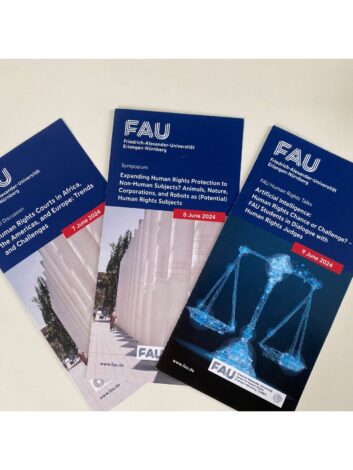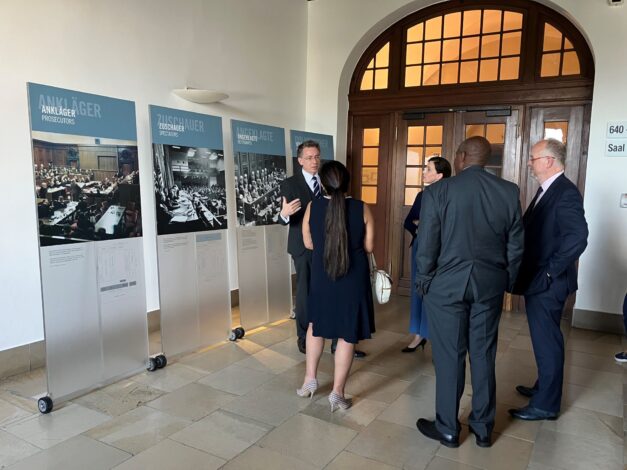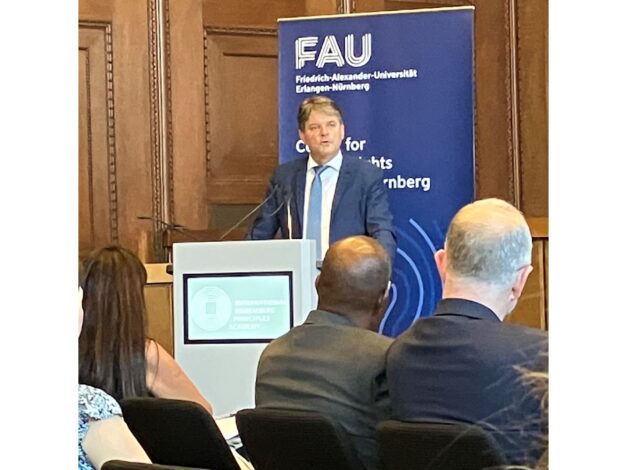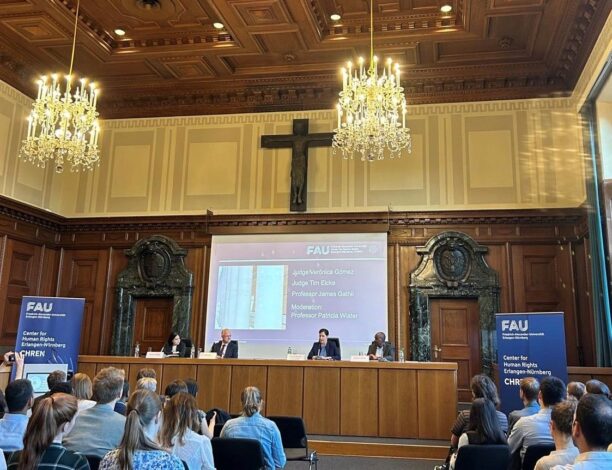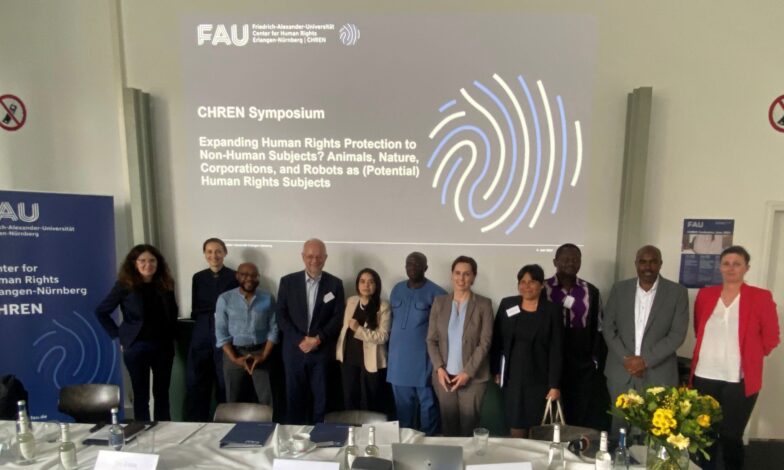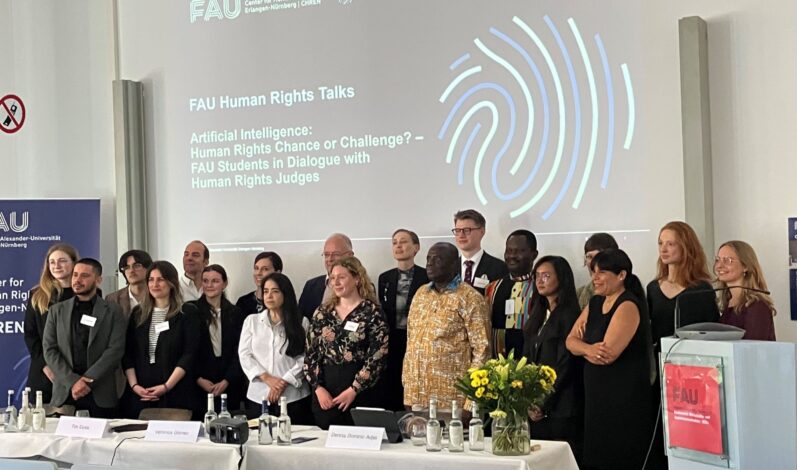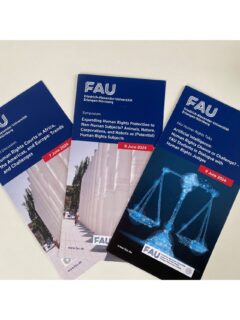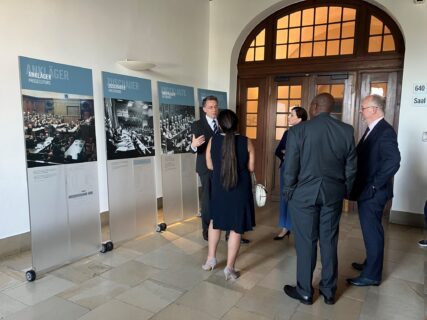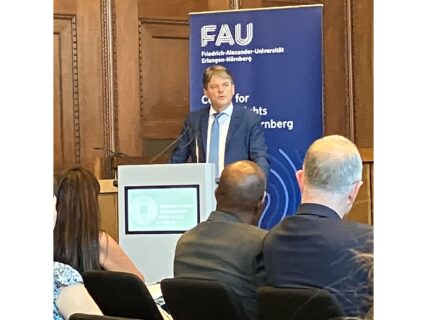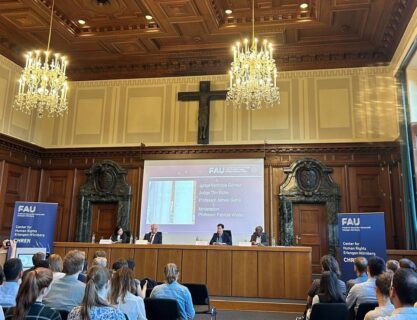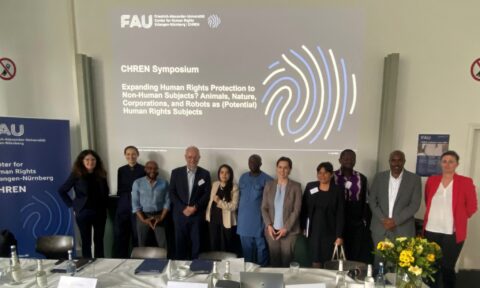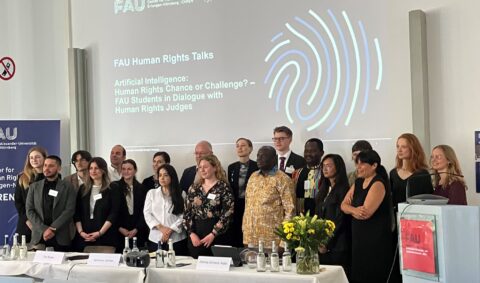CHREN Conference June 2024

The CHREN Conference – Some Impressions
7 June 2024, 7:30 pm – 9:00 pm, Panel Discussion – followed by a reception
„Human Rights Courts in Africa, the Americas, and Europe: Trends and Challenges“
The conference is open to students, academics, practitioners and interested parties. Participation is free of charge.
Venue: International Nuremberg Principles Academy, Courtroom 600, Nuremberg Palace of Justice, Bärenschanzstraße 72, 90429 Nürnberg
Regional human rights courts play an increasingly important role in the promotion of justice and the protection of rights and freedoms. However, they face persistent challenges such as ensuring compliance with their judgments by member states, navigating political pressures, and addressing evolving human rights issues like climate change. On the panel, Patricia Wiater (CHREN, FAU Erlangen-Nürnberg) will discuss current trends and challenges with Justice Dennis Dominic Adjei (African Court on Human and Peoples’ Rights), Judge Verónica Gómez (Inter-American Court of Human Rights) and Judge Tim Eicke (European Court of Human Rights) and the academic expert on international courts, James Thuo Gathii (Loyola University Chicago School of Law).
Programme
- Welcoming
by Christoph Safferling, Director of the International Nuremberg Principles Academy - Greeting
by Joachim Hornegger, President of FAU - Panel Discussion
8 June 2024, 9:30 am – 5:00 pm, Symposium
„Expanding Human Rights Protection to Non-Human Subjects? Animals, Nature, Corporations and Robots as (Potential) Human Rights Subjects“
The symposium can be attended online (register here) or in person. To participate in person, please register by email (oer3-lehrstuhl-wiater@fau.de), stating your name, institutional affiliation and field of work. Participation is free of charge.
Venue: FAU Erlangen-Nürnberg, School of Business, Economics and Society WiSo, Findelgasse 9, 90402 Nürnberg
Human rights practice is at a crossroads when it comes to dealing with non-human subjects. The European Court of Human Rights grants human rights protection to corporations, the Inter-American Court of Human Rights indicated to recognise components of the environment (e.g. forests, rivers, and oceans) as subjects of protection, in line with ‘Rights of Nature’ approaches. The African system adopts an intermediate position. The fact that human rights protection is already, in part, open to non-human subjects gives rise to a ‘coherence demand’ for the inclusion of others, such as animals and AI. The non-human entities the symposium deals with are all related to global governance challenges, namely planetary environmental crises, the globalisation of production networks, and digitalisation.
The symposium will consider the different regional human rights approaches and critically analyse the potentials and risks of addressing these global challenges by granting human rights protection to non-human entities.
Members of the three regional human rights courts, namely Justice Dennis Dominic Adjei, (African Court on Human and Peoples’ Rights), Judge Verónica Gómez (Inter-American Court of Human Rights), and Judge Tim Eicke (European Court of Human Rights), will take part in the symposium and discuss with the speakers after the presentations.
Programme
| 9:30 | Welcome coffee and opening remarks Patricia Wiater, FAU Erlangen-Nürnberg |
| 10:00 | Session 1 ‘Corporate Human Rights’: Obstacle or Precursor to Corporate Human Rights Accountability? Michael Waibel, University of Vienna |
| 10:30 | Discussion moderated by Markus Krajewski, FAU Erlangen-Nürnberg |
| 11:00 | Coffee break |
| 11:30 | Session 2 ‘Rights of Nature’ in Human Rights Courts or a Parallel Protection System? Monica Feria-Tinta, Twenty Essex London |
| 12:00 | Discussion moderated by Laura Clérico, University of Buenos Aires/FAU Erlangen-Nürnberg |
| 12:30 | Lunch break |
| 1:30 | Session 3 Animal Rights as Human Rights: Anthropocentric, Zoocentric, and Ecocentric Rationales Saskia Stucki, Max-Plack-Institute for Comparative Public Law and International Law, Heidelberg |
| 2:00 | Discussion moderated by Heiner Bielefeldt, FAU Erlangen-Nürnberg |
| 2:30 | Session 4 If Human Rights Protection for Corporations, why not for Robots too? Patricia Wiater, FAU Erlangen-Nürnberg |
| 3:00 | Discussion moderated by Paulina Jo Pesch, FAU Erlangen-Nürnberg |
| 3:30 | Coffee break |
| 4:00 | Session 5 Corporate Accountability and Environmental Protection from the Perspective of African (Human Rights) Courts James Gathii, Loyola University Chicago School of Law |
| 4:30 | Discussion moderated by Thoko Kaime, University of Bayreuth |
9 June 2024, 9:00 am – 5:00 pm, FAU Human Rights Talks
„Artificial Intelligence as a Human Rights Chance or Challenge? – FAU Students in Dialogue with Human Rights Judges“
The FAU Human Rights Talks can be attended online (register here) or in person. To participate in person, please register by email (oer3-lehrstuhl-wiater@fau.de), stating your name, institutional affiliation and field of work. Participation is free of charge.
Venue: FAU Erlangen-Nürnberg, School of Business, Economics and Society WiSo, Findelgasse 9, 90402 Nürnberg
The use of AI represents both an opportunity and a challenge for human rights protection. Its ability to analyse vast amounts of data can expedite investigations and enhance access to justice, potentially streamlining proceedings. However, concerns persist regarding AI’s potential biases, transparency issues, and the need to balance efficiency with safeguarding human rights, highlighting the necessity for careful implementation and oversight in human rights proceedings. In interactive sessions, FAU students will explore chances and challenges and discuss with members of the three regional human rights courts, namely Justice Dennis Dominic Adjei and Registrar Robert Eno (African Court on Human and Peoples’ Rights), Judge Verónica Gómez (Inter-American Court of Human Rights), and Judge Tim Eicke (European Court of Human Rights).
Programme
| 9:00 | Welcome and Opening Patricia Wiater, FAU Erlangen-Nürnberg |
| 9:30 | Session 1 AI in Government Decision-Making |
| 11:00 | Session 2 Use of Large Language Models in Human Rights Proceedings |
| 12:30 | Lunch break |
| 1:30 | Session 3 Open Source Investigations/Citizen Media Evidence in Human Rights Proceedings |
| 3:00 – 5:00 | Get together |
